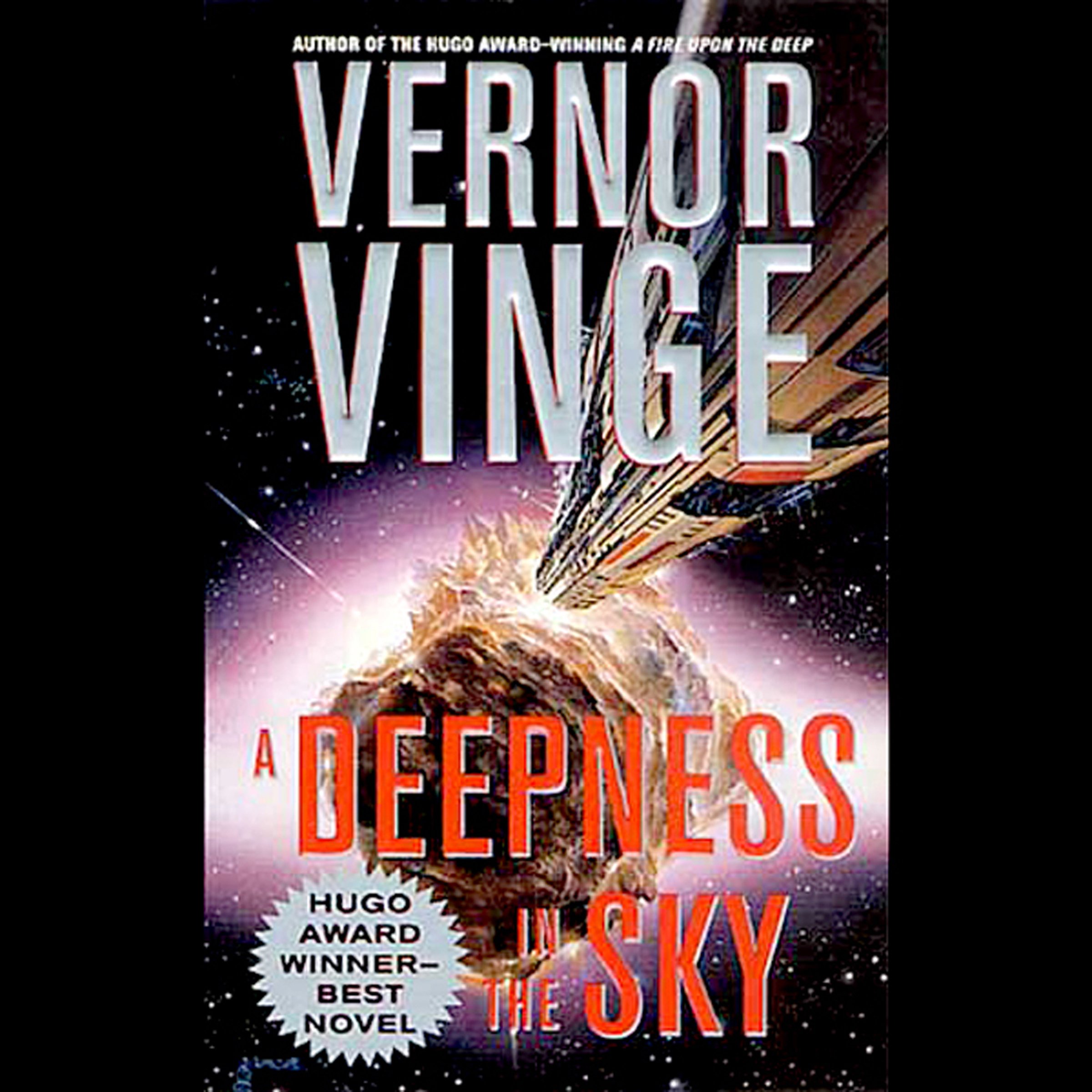The following contains mild-ish spoilersI first came across Verner Vinge when looking for some authors who could give me something that has been dearly missing since the demise of Iain M. Banks, a good old fashioned Space Opera. I picked up his first book 'A Fire on the Deep' which clipped along nicely and was for the most part (despite a fairly unsatisfying ending) scratched the itch and so gamely picked up the second book expecting more of the same.Careful what you wish for. A deepness in the sky was indeed more of the same, to a fault, but minus the sense of adventure and quest of the former (in this book the protagonist for the most part don't go anywhere, spending most of their time on a spaceship). It becomes starkly obvious that Mr. Vinge is something of a fan of capitalism, we all have our kinks and weirdnesses to be sure, but each to it's time and place, someone who can't imagine anything better than free market capitalism, is far to credulous in their understanding and doesn't really have any business writing speculative fiction about the future. The vision of free market capitalism presented in this book, is one which any 90's White House economic advisor would recognise and approve of (and was such a wild success in the former Soviet block it saw life expectancy fall by nearly a decade), capitalism is freedom and freedom is capitalism, and if you don't like capitalism you must hate freedom. Never mind history, never mind famine, slavery followed by wage slavery, never mind empire and colonialism or gunboat diplomacy, the beauty of the free market can never be superseded, who needs art?Two other phenomena Vinge has a weird fetish for are geniuses and autism. Whereas in his last book we were treated to only two geniuses, here we have about a dozen, including alien spiders. They see things no one else can see (except the treachery of the bad guys), they make things no one else can make, other character express their profound admiration and disbelief and of course they save the day, no plot point can stand in their way. Of course this is genius in the modern sense, the old sense of genius was that it was a manifestation of God or a spirit (hence 'genie') working through you, it was a sign that you had perfected your craft, the concept implied humility not grandiosity, someone who had surrendered and dedicated themselves to a craft so a cobbler could be a 'genius' I they were a good cobbler, or anyone who did anything well. The modern sense has none of that, it is a unique profoundly rare thing that only the most special of special people have, compared to whom other mere mortals may as well be mud figurines, the world pauses for breathe when they are inspired and shakes when they shout "eureka". It exists in isolation in the individual of course and has nothing to do with environmental or collective considerations. The author clearly fancies themselves as such a luminary, the perfunctory prose, barely extant plot (I can't fathom why this book needed to be so long) and narrow rota of character types, says otherwise.As for autism, well in this book the badies have a secret weapon/unfair advantage that allows them to defeat the space-faring capitalism geniuses, they can give people autism, in this book it's presented as a mutation/side effect of something called "mind rot", but whatever name it is given in the book it is plainly clear what is being described here, on both a symptomatic and functional level. It is described as a kind of slavery as well as a perfect fusion of machine and man. In other words perpetuating every negative autistic stereotype you could imagine, less-than-human automatons with not even the decency to grant them agency.It is not surprising that the post war generation born to a country which had an unprecedented volume of the world's wealth in the aftermath of WW2 have a curiously affectionate view of capitalism earlier sci-fi authors did not. Though when it comes to imagining or envisioning the future the trick is to imagine something different, either worse or better, that will tell us something about the moment we live in indirectly. Routinely informing the reader that "free market" capitalism is the best thing ever does nothing any hack politician or journalist wouldn't tell you either today or thirty years ago.This wouldn't even matter is the book showed an author building on the previous work rather than, using the same bag of tricks only less imaginatively, but despite being a 600+ page book it's so lacking in substance that these flaws stand out so starkly and the rest fades into mush.As with 'a fire on the deep' we get a bad guy who presents a deceptively nice outward face to a confused young genius, but is really both evil and cruel. You get an alien race (this time one rather than two) albeit one far less differentiated and interesting than the telepathic dog pack aliens from the former book. We have a large maguffin that the author sets up in the early portion of the book and then ignores (in the former a hyper-advanced, galaxy threatening malevolent AI, in the latter the on-off star, neither explored nor explained). Unlike with the former there is no real sense of journey or quest, the main characters pretty much all stay in the same place, creeping their way to a forgone and heavily-telegraphed, unrevealing conclusion.I finished it, so it can't have been all bad which is why it get two not one stars, but in hindsight it really wasn't worth it, I don't know why the modern era can't seem to do decent space opera anymore. Where people travel interstellar distances, meet a variety of weird civilisations, ride in big F*** off spaceships, have the odd space battle and make use of wondrous technologies, but it seems the particular knack of being able to do it passed with Iain M. Banks. Next time I'll stick to the classics, people who can both write with stunning prose, imagine the unimaginable, and show us genuinely new worlds and new paradigms, true artists of sci fi, Le Guin, K Dick, and Gene Wolfe.




